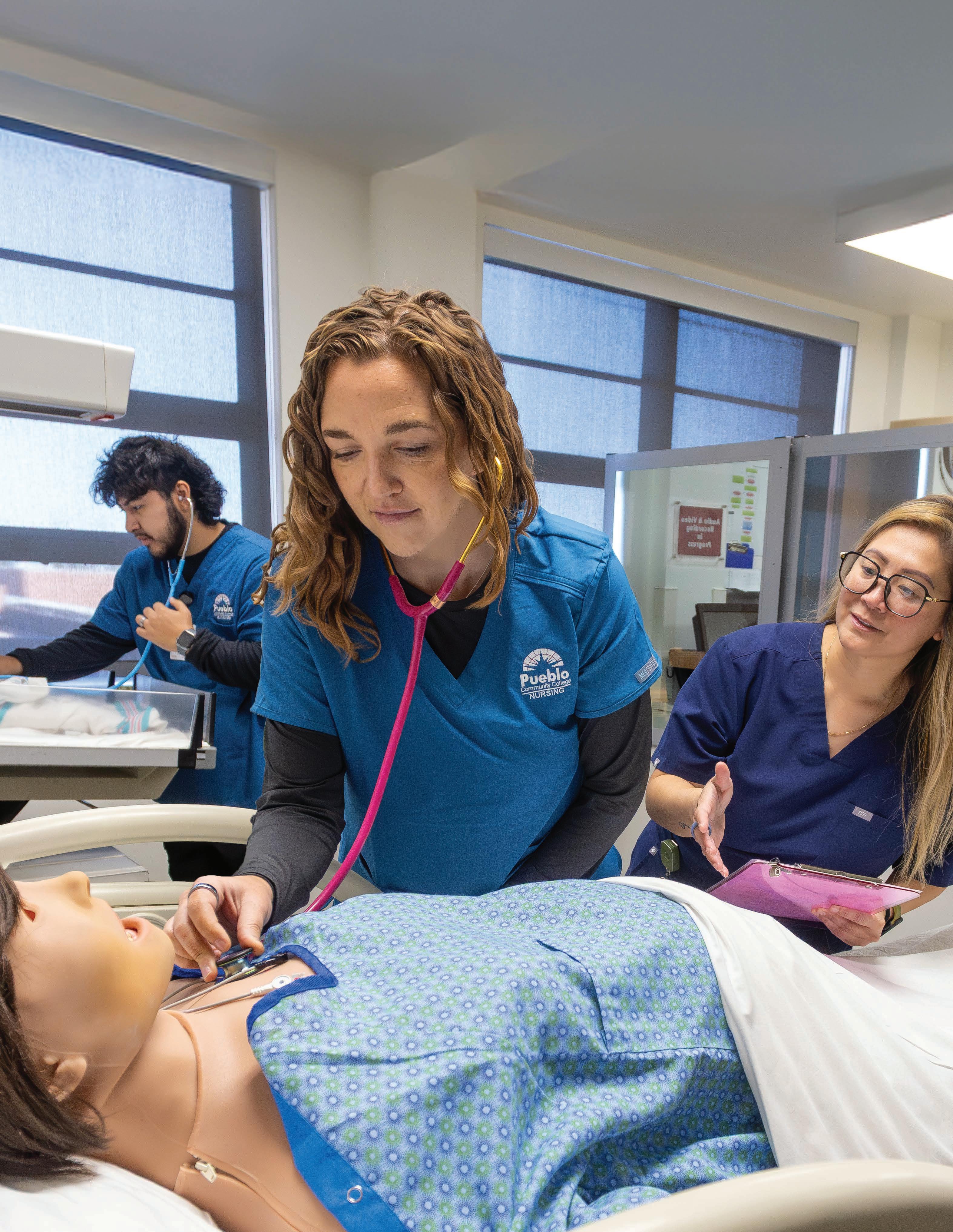

COMMUNITY REPORT
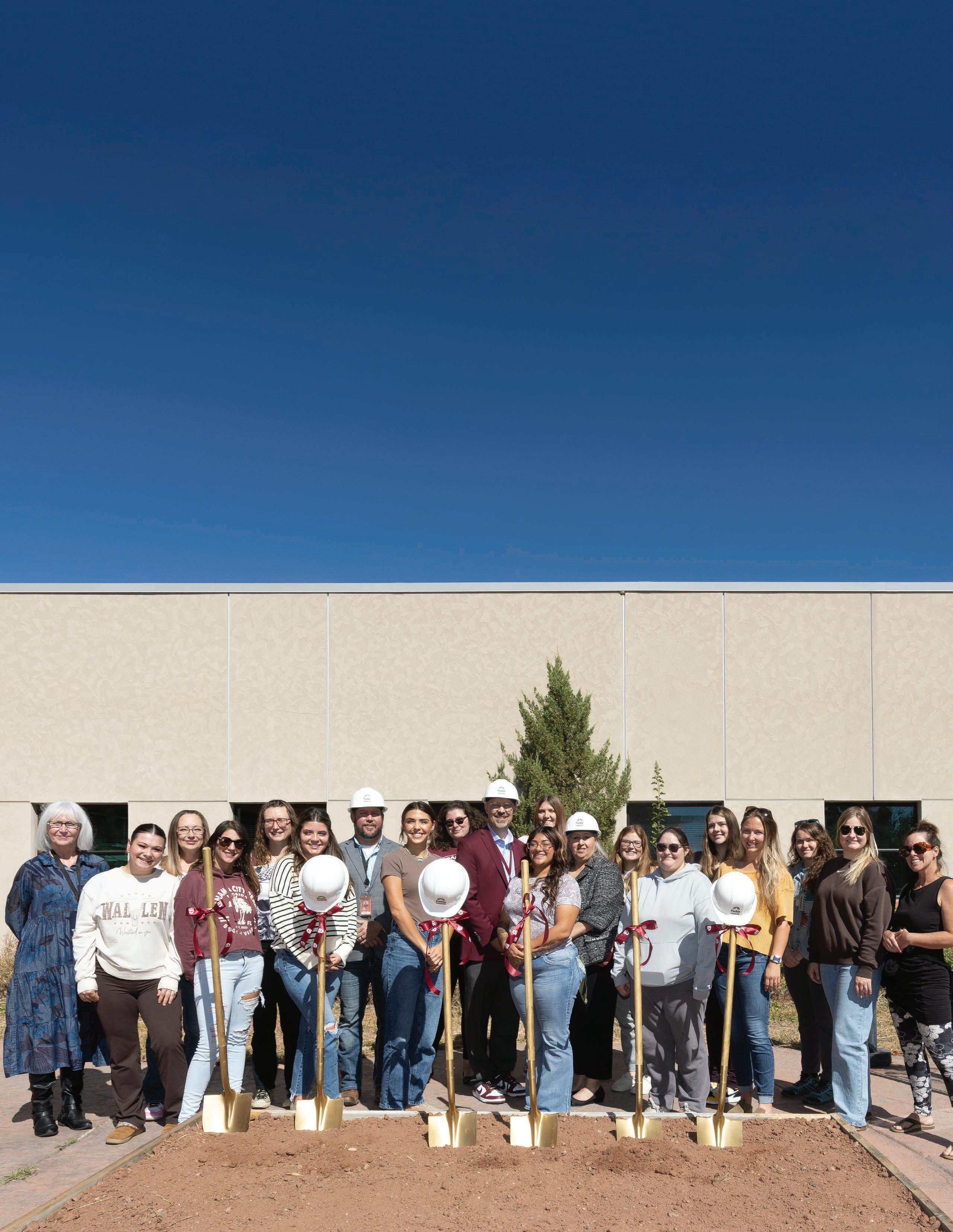
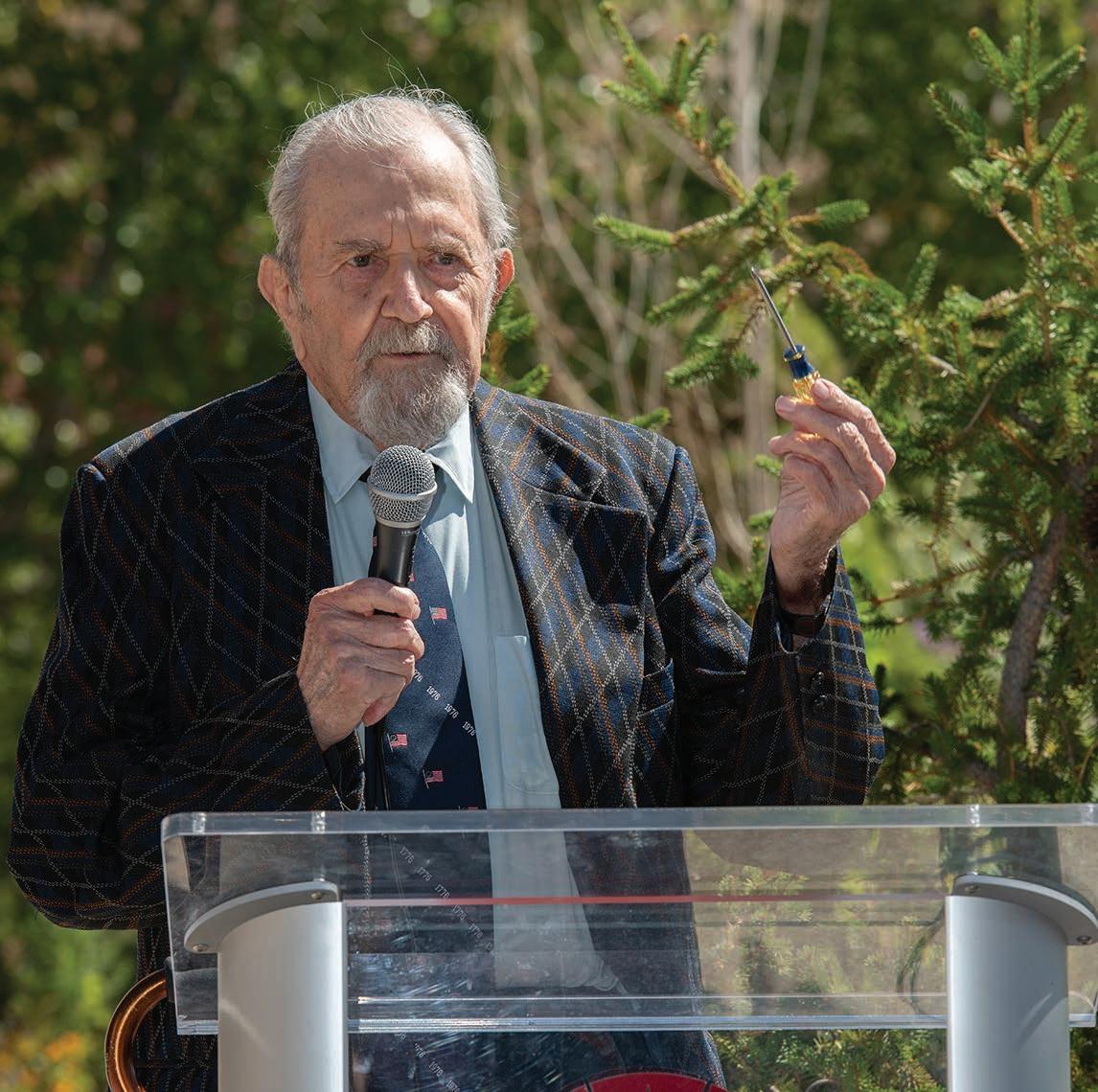
"Payback has been very important to me – that there has been a bit of me that will continue after I’m gone."
WALTER SCHEPP
BOTTOM PHOTO: PCC Fremont Campus nursing students helped celebrate the groundbreaking for a new nursing simulation center. Longtime supporter Walt Schepp donated the funds to build the oncampus facility. See page 23 for more information.
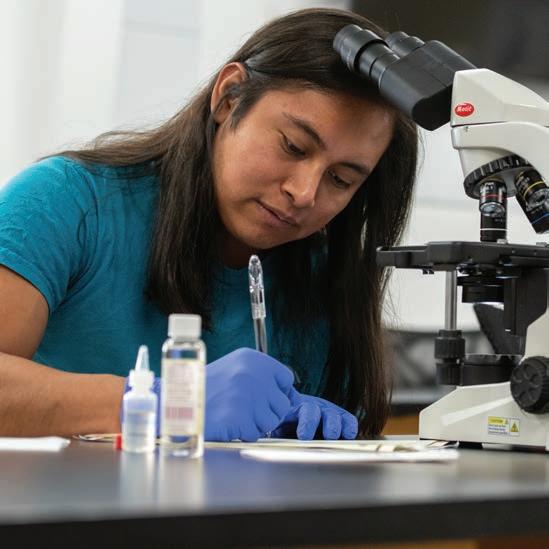

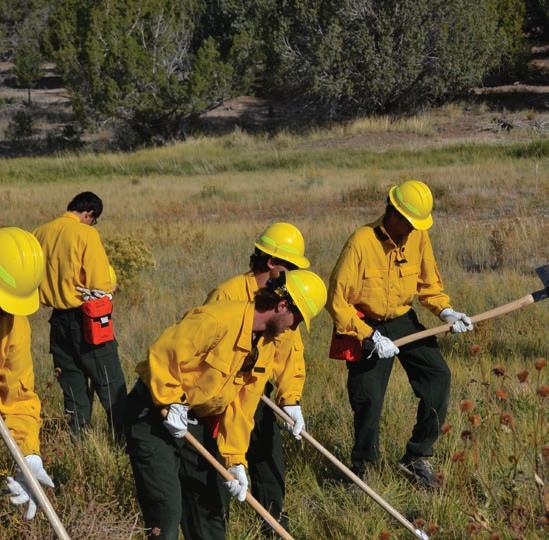
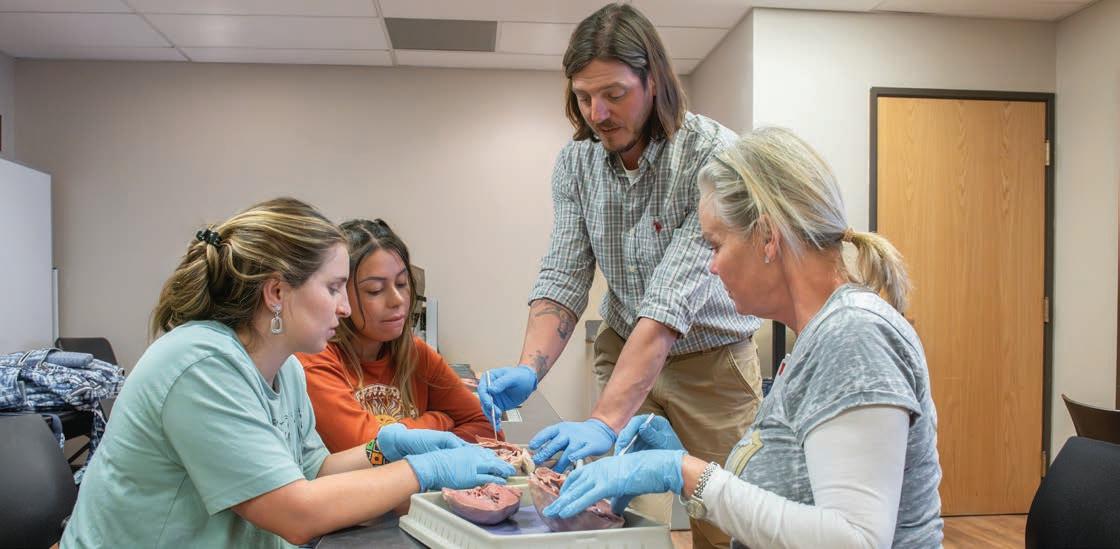
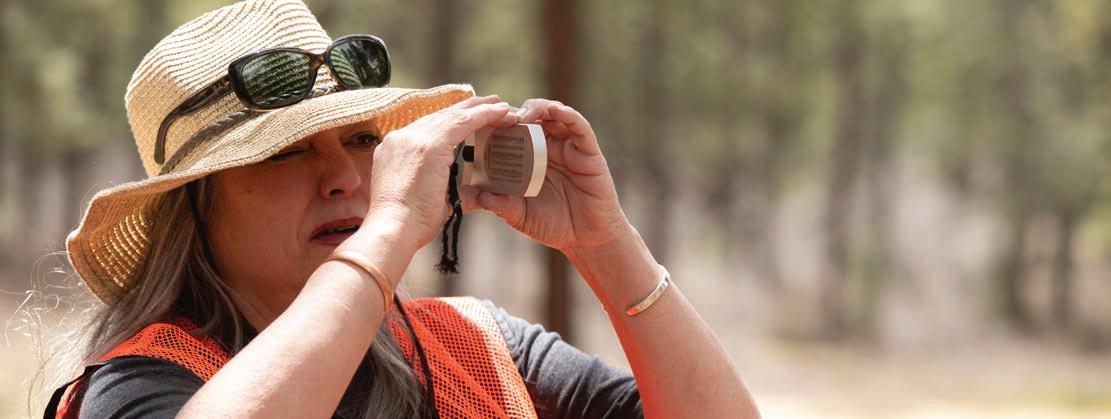
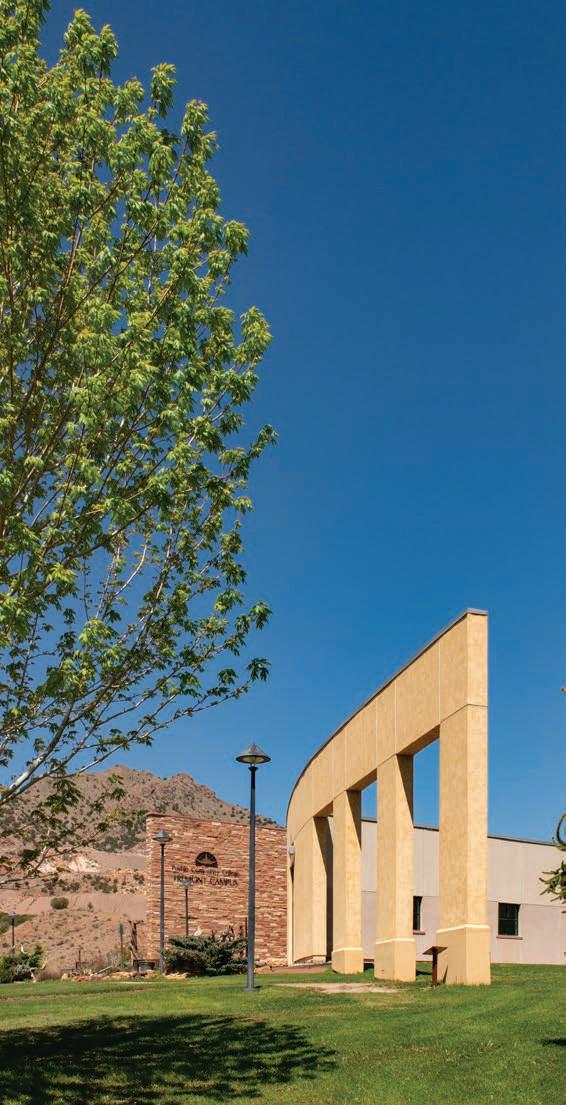
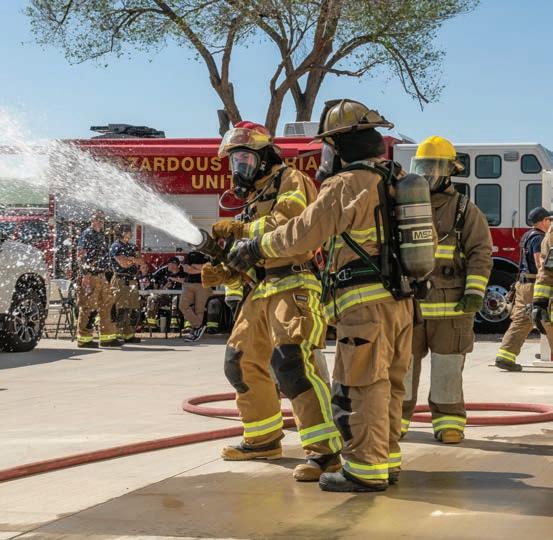

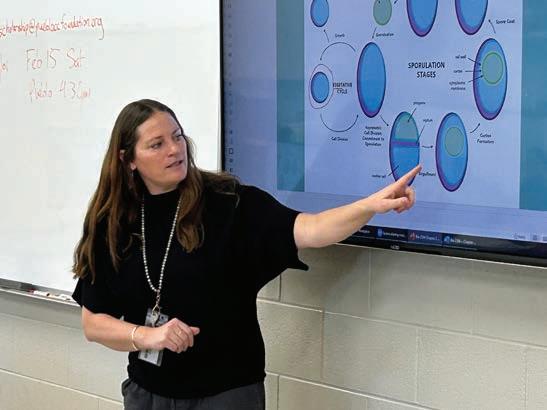
Nicki
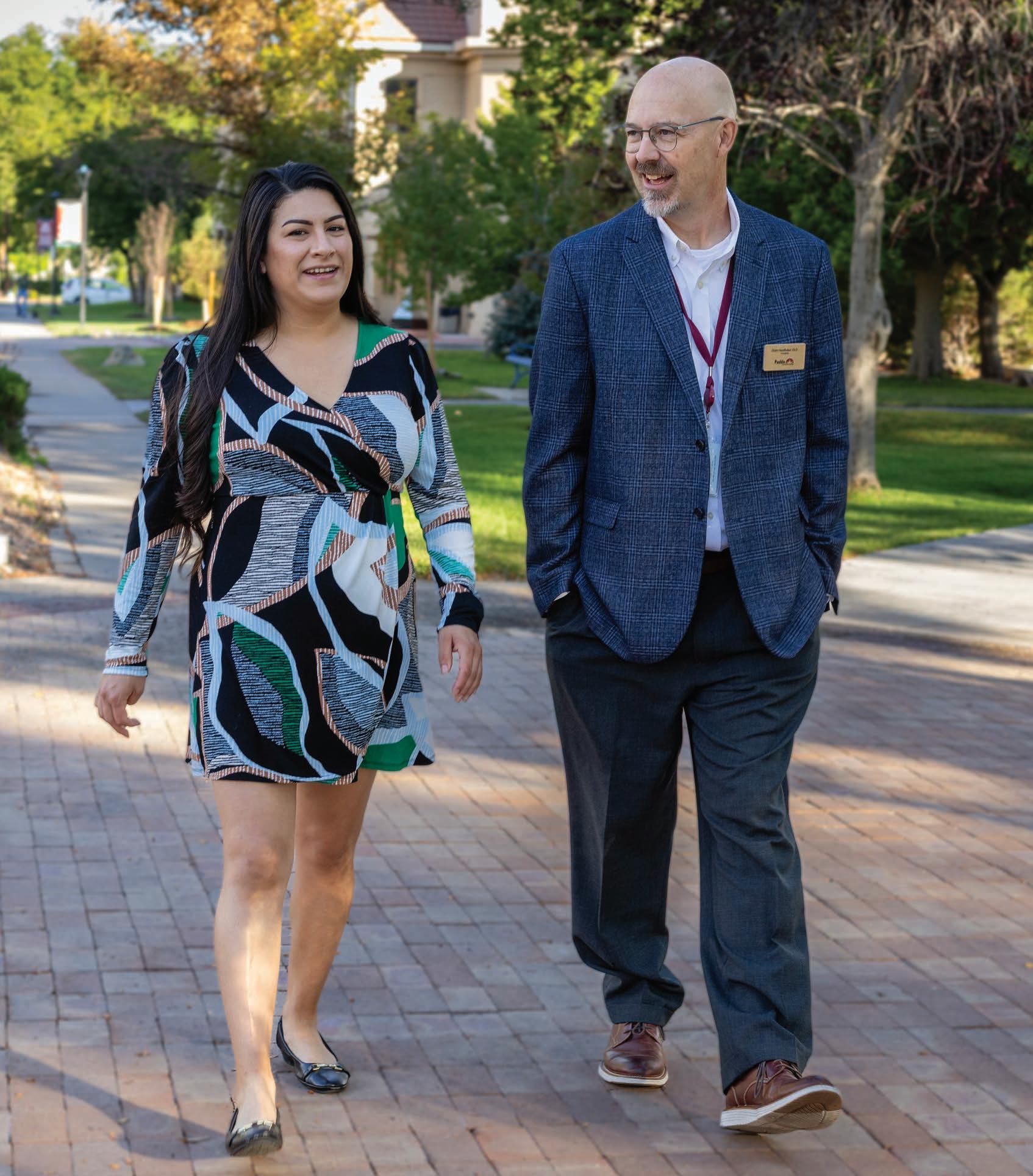
“What keeps me excited about the future of the college and the region is that I see solutions in the making every day.”
DR . CHAT O HAZELBAKER
A Letter from the President
Pueblo Community College is at the center of many of the good things happening in southern Colorado, and I’m happy to be able to share some of those stories with you in this annual report.
We all know that there are challenges in our communities. What keeps me excited about the future of the college and the region is that I see solutions in the making every day. A lot of mornings when I arrive on the Pueblo campus, the first people I see are future police officers – those who will serve our region – doing their physical training. That program is one of the absolute best in the state and is near capacity each semester in Pueblo and in Mancos.
Sometimes I’ll take a walk around campus and am likely to see one of our trucks being used to train students for their Commercial Driver’s License (CDL), a job with many openings that starts at far more than a living wage. I might also see students working in the state’s first and finest electric vehicle classes, and I’ll hear the sounds of machining and welding coming from the shop. Our industry partners are all eager to hire those students because they are well trained and our regional industry needs them.
It’s not just during my walks that I see good things happening. As I meet with our industry partners, I hear about how PCC’s Corporate College is providing services
at our locations and through their mobile labs to offer the additional training needed to grow our local workforce. I also have a chance to talk about what we can provide as we work with many partners to bring new industry to the region.
In Fremont County, our new nursing simulation center will help us continue to train the next generation of health care professionals. On a recent trip to Durango, I had the opportunity to sit down with the Southern Ute tribe and talk about several programs including construction, which is helping address housing needs in that area.
There are too many things to fit into a short letter but know this: My personal mission is to make sure students are prepared for living-wage jobs to improve the community, and every day I see that happening at PCC. Thank you for being a part of it, and do not hesitate to reach out with ideas, suggestions, or ways we can work together to meet the challenges facing southern Colorado.
Dr. Chato Hazelbaker President, Pueblo Communtiy College
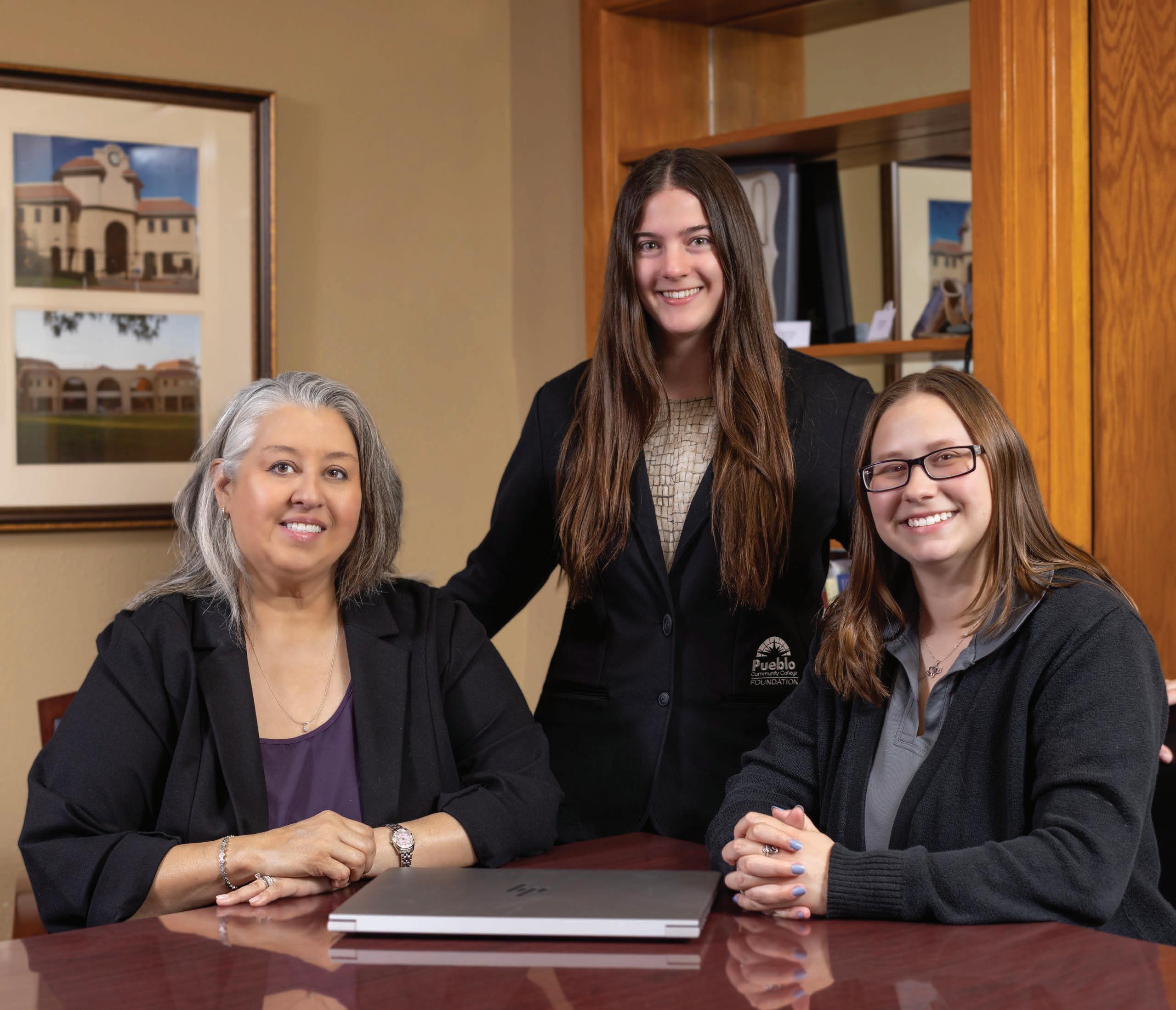
Photo: Julie Rodriguez, Holly Ward, Taylor Lanoue
A Letter from the Pueblo Community College Foundation
As the seasons change, I am reminded of the transformation the Pueblo Community College Foundation is undertaking as we move forward with new leadership to meet the needs of our students and communities we serve in an ever-changing environment.
Earlier this year, I was selected to join the PCC Foundation as the chief executive officer. I am honored to have been chosen to lead the foundation as we move into a new chapter. My vision for the next phase of the foundation centers on partnering with the board of directors and President Hazelbaker to further elevate the college’s impact. I look forward to deepening our existing relationships and fostering new connections with donors and community leaders.
I am proud to work for an organization that is responsive to students and their needs, helping them thrive and become the best version of themselves. During my first few months here, I became aware of the need for the foundation to provide additional funding to students who enrolled in classes during the mid-summer months, in anticipation of the fall semester. They had missed the first scholarship application deadline before making the decision to start their educational journey. We immediately developed the Second Wind application and opened a second scholarship round. The response was overwhelming, and we plan to incorporate this aspect into our scholarship program going forward.
Our donors are the backbone of the work we do, providing support to students and academic
departments that enable them to offer state-ofthe-art equipment and learning opportunities for our students. In this report, you will read more about the transformative philanthropic gift made by Walter Schepp that will allow students at the Fremont Campus to engage in hands-on training in the nursing simulation lab that will prepare them for real-life work. The generosity of our donors and supporters is vital to the education we provide our students, and we are honored that they choose to support the foundation and PCC.
Soon, we hope to revive our alumni association and provide opportunities for our esteemed graduates to engage more with our campus community and strengthen their relationships with fellow alumni. If you are interested in learning more about the foundation or would like to connect with us as an alumnus, please reach out.
Thank you for being part of the PCC Foundation community. Your kind support is so meaningful to our students and our community.
With gratitude, Julie Rodriguez
CEO, Pueblo Community
College Foundation
AROUND C AMPUS CAMPUS
Corporate College adds 2 mobile labs
Pueblo Corporate College, a division of PCC, added two new mobile learning labs to accommodate our workforce partners’ needs for skilled Commercial Driver’s License (CDL) holders and heavy equipment operators.
The 42-foot CDL lab includes two training simulators that allow students to practice for a range of driving conditions and train for Class A and B licenses including passenger, hazmat, and school bus endorsements. The heavy equipment operator lab enables students to simulate excavator, dozer, motor grader and small-wheel loader operations.
Both simulators provide a safe environment for students to gain experience and confidence before making the move to real-world operations. The labs also allow Corporate College to go where these skills are most needed and requested, including rural areas that may not have everyday access to this type of training.
Southwest Space Grant team earns honors
In April, teams from PCC Southwest competed against approximately 20 schools and earned three awards in the Colorado Space Grant Consortium’s autonomous rover challenge, including best overall for their weight class. They

were led by Melissa Watters, the STEM academic and career expert for the Southwest campus.
The Space Grant program at PCC provides exceptional STEM opportunities for students of all majors. This NASAfunded program connects PCC with approximately 20 other Colorado schools to inspire and develop America’s future technological workforce through hands-on space-related projects.
Each year, students attend a research symposium and participate in one of three challenges, including the robotics challenge. Members of PCC’s Space Grant teams meet weekly on the Pueblo and Southwest campuses and receive stipends upon completing their challenges and attending the symposium.
Concurrent enrollment opportunities expand
Concurrent enrollment students in Pueblo County have several new opportunities to earn college certificates without leaving their high school campus.
Welding: South High School added welders with increased process capabilities, which allows PCC to have faculty member on site and offer a full welding certificate to students there.

Machining: At Pueblo County High School, the addition of several manual mills and manual lathes means students can now earn a manual machining certificate under the guidance of a part-time PCC instructor.
Automotive service technology: Pueblo West High School expanded its on-campus automotive program so students can earn more industry credentials in electrical systems, air conditioning maintenance, and brakes.
Fremont Campus relaunches disc golf course
After a seven-year hiatus, the Heritage Trail Disc Golf Course on PCC’s Fremont Campus reopened in May. The 18-hole course was paid for by student fees but is also open to PCC employees and the public. There is no charge to play.
The 40-acre course was heavily damaged by a flash flood in 2018, and repairs were further delayed by the COVID pandemic. Campus Administrator Mike Maffucci was able to restart the project in 2024.
With views of the Wet Mountains and Skyline Drive, the course draws players from throughout the region. Visitors can also access geology and history trails from the course starting point to learn more about the surrounding area.
“Recreation is huge in Fremont County, so providing a good disc golf course is a way to draw the community to campus and get them comfortable being here,” said Maffucci. “That’s especially important to me.”
Training helps incarcerated students
A $581,000 contract with the Colorado Department of Corrections allowed PCC’s Corporate College to provide specialized training for incarcerated students throughout the state.
“This contract represents a significant step towards empowering individuals with the skills and knowledge necessary for successful reintegration into society,” said Executive Director Amanda Corum. “Our commitment is to deliver high-quality, accessible education that fosters personal growth and opens doors to new possibilities.”
Courses were offered in occupational safety and health, condensed HVAC technician (preparing
students for the EPA 608 Universal Certification), electrical systems, and electrical preapprenticeship. Instruction and support continue to be provided once individuals are released.
Nursing student wins statewide award
Deanna Molina-Nevarez, a recent graduate of PCC’s nursing program, was honored in April as the first recipient of the Rollie Heath Award from the Colorado Community College System. The award recognizes a successful college student who earned concurrent enrollment credits in high school and demonstrates academic excellence, leadership, and a commitment to community service. (Read more about PCC’s concurrent enrollment program on page 16.)
Molina-Nevarez graduated from Pueblo South High School and is a first-generation college student. While taking classes full time and working, she also served as a caregiver for her younger siblings and was active in PCC’s Nursing Student Association. She received her associate degree in May and is enrolled in PCC’s bachelor’s degree-completion program for nursing. She expects to complete her studies in 2026.
Rollie Heath, for whom the award is named, is a former Colorado state senator and former chair of the State Board for Community Colleges and Occupational Education. Throughout his career, he focused on building concurrent enrollment pathways for students. PCC has CE partnerships with school districts throughout its service area.
Grant helps expand advanced manufacturing pathways
A $5.75 million grant from the U.S. Department of Labor will enable PCC to partner with Trinidad State College, workforce agencies, regional employers, and other organizations to address critical needs in advanced manufacturing.
The four-year Strengthening Community Colleges Training Grant, for which TSC serves as the fiscal lead, allows PCC and TSC to collaborate with Emergent Campus, a rural business incubator with locations in Florence and Trinidad. The colleges will expand programs such as robotics, automation, welding, and construction while Emergent Campus will offer students internships and work-based learning programs in those fields with area employers. The education pathways align with industries that are experiencing rapid growth due to state,
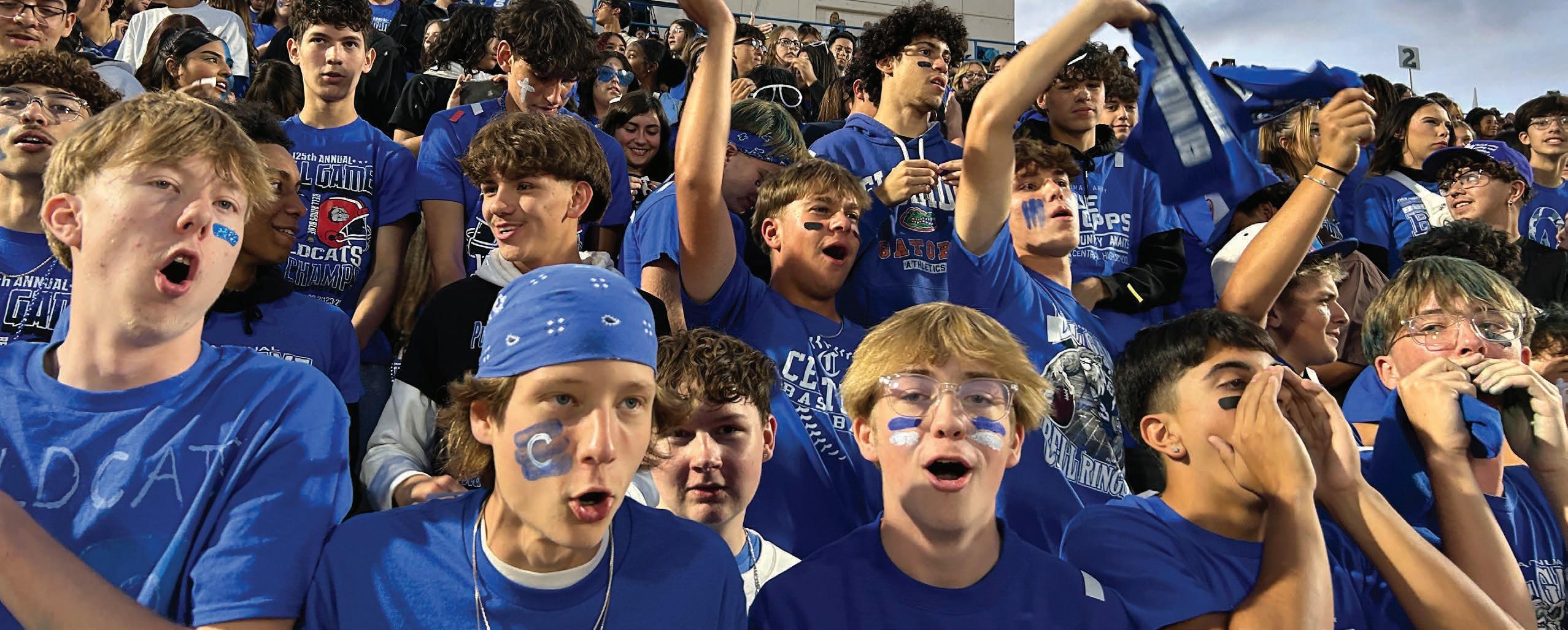
regional and national priorities – clean energy, affordable housing, and transportation infrastructure.
In addition to manufacturing companies, the collaborative includes the Fremont Economic Development Corporation, South Central and San Luis Valley Board of Cooperative Educational Services, Colorado Education Initiative, Data Driven Economic Strategies, Colorado Rural Workforce Consortium, SkillsUSA and Upper Arkansas Council of Governments.
PCC named Career Connected Campus
Pueblo Community College was the only two-year institution among seven Colorado colleges and universities to receive the new Career Connected Campus designation from the Colorado Department of Higher Education last November.
Career-connected colleges are “committed to empowering students with the knowledge, skills and resources needed to succeed in their chosen careers and make meaningful contributions to their respective industries,” according to the CDHE. The designation is for the years 2024-2027.
The selection highlights PCC’s commitment to preparing students for employment that aligns with their credentials. In addition to academics, the CDHE checklist focuses on practical skills, professional development and career readiness.
PCC’s Career Services office provides all students assistance in areas such as career counseling, employer connections, networking events and interview preparation.
The Career Connected Campus is part of the state’s Workforce Determinants of Student Success initiative to emphasize career preparation. Other institutions to receive the honor were Colorado College, Colorado School of Mines, CSU Global, Regis University, University of Colorado Denver, and the University of Denver.
Expanding community traditions
Through a partnership with Pueblo School District 60 and KDZA radio, PCC’s Center for New Media brought Pueblo’s two biggest high school football traditions, the Bell and Cannon games, to audiences online, on TV and on the radio in 2024 and 2025.
While approximately 10,000 people attend each game in person, well over 100,000 additional viewers throughout the U.S. and other countries watched the contests each year via PCC’s broadcast on Facebook, Xfinity public access Channel 19, KRDO digital channel 13.3 and KDZA. The games remain accessible online and are replayed on Xfinity multiple times during November and December.
In addition to amplifying the reach of these longtime community traditions, the live production provides a valuable hands-on learning opportunity for PCC broadcasting students.
Southwest Campus opens STEM building
PCC’s Southwest Campus in Mancos now has a new designated Science, Technology, Engineering and Mathematics (STEM) building to house classes and its many extracurricular activities.
The space opened in August 2024 and is open to all students. They have access to equipment such as 3D printers and other resources. The building serves as the base for PCC’s Colorado Space Grant Consortium Robotics Challenge teams, which compete against other colleges each year at Great Sand Dunes National Park. It is also the site for activities and workshops involving K-12 students from Cortez and Mancos, which helps the STEM team spread the word about PCC’s programs.
The renovation project was funded through grants from the Department of Education Hispanic-Serving Institutions Division and STEM Excellence in Development, Student Growth and Equity (EDGE) program.
NOTABLE EVENTS
All community events are free to attend.


Please visit PCC’s online calendar for a complete list of upcoming events: pueblocc.edu/events.
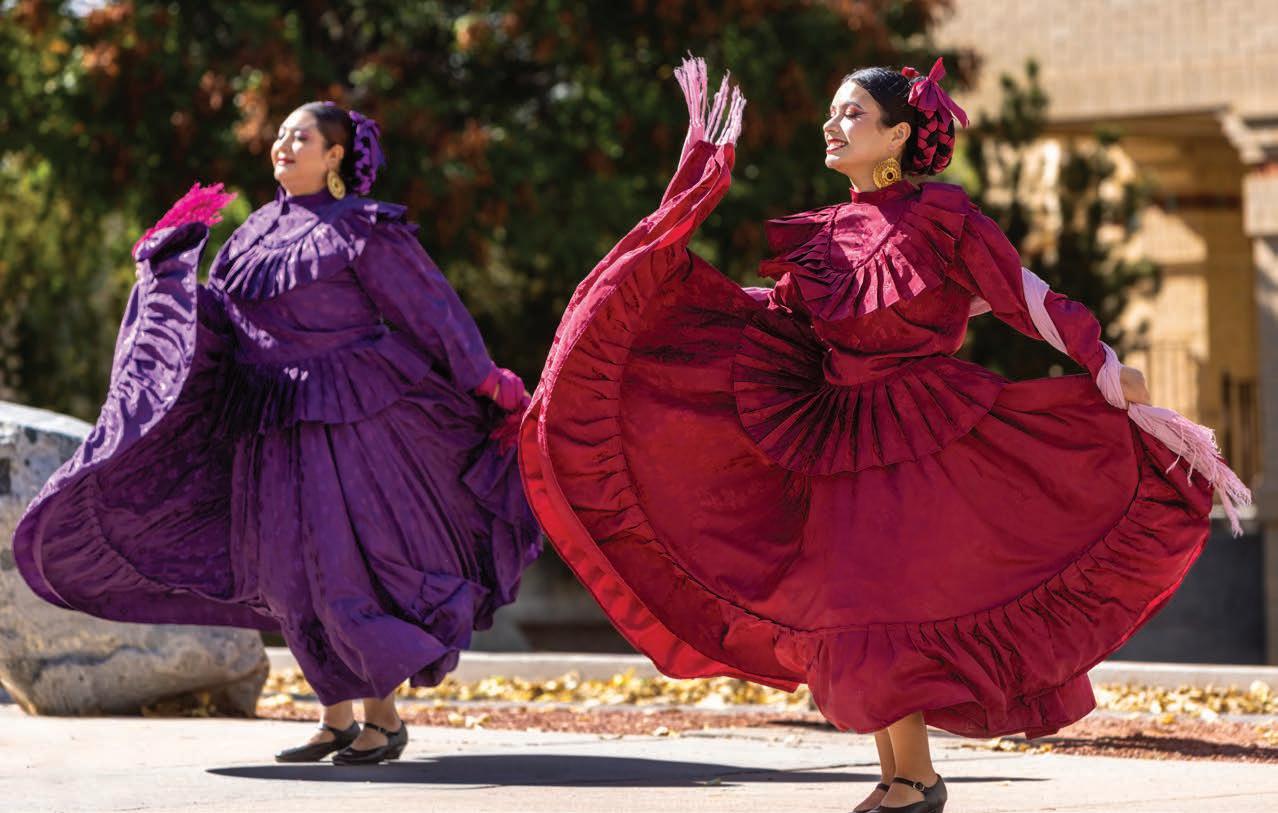
FALL
Monday, Oct. 27 – Spring registration begins
Friday, Oct. 31 – Horror on the Hoag family Halloween event, 4-7 p.m., PCC Courtyard
Monday, Nov. 3-Wednesday, Nov. 26 –DINOvember! in partnership with the Rocky Mountain Dinosaur Resource Center, 8 a.m.-5 p.m. MondayFridays, PCC Library (See online calendar for specific DINOvember! events.)
Wednesday, Nov. 12 – Pueblo History Speaker Series: Jeannie Sandidge discusses the history of the Pueblo Army Air Base, airport, and Weisbrod Aircraft Museum, 11 a.m.-noon, PCC Hoag Theater
Friday, Nov. 14 – SoCo & AI at PCC Conference
Saturday, Nov. 29 – Pueblo Parade of Lights Broadcast
WINTER
Wednesday, Feb. 25 – Black History Month event: The Hidden History Shaping Healthcare Today: Lessons for Today's Health Profession from Harriet A. Washington, 1-4 p.m., Fortino Ballroom
SPRING
Thursday, May 14 – Pueblo and Fremont Campus commencement
Saturday, May 16 – Southwest Campus Commencement
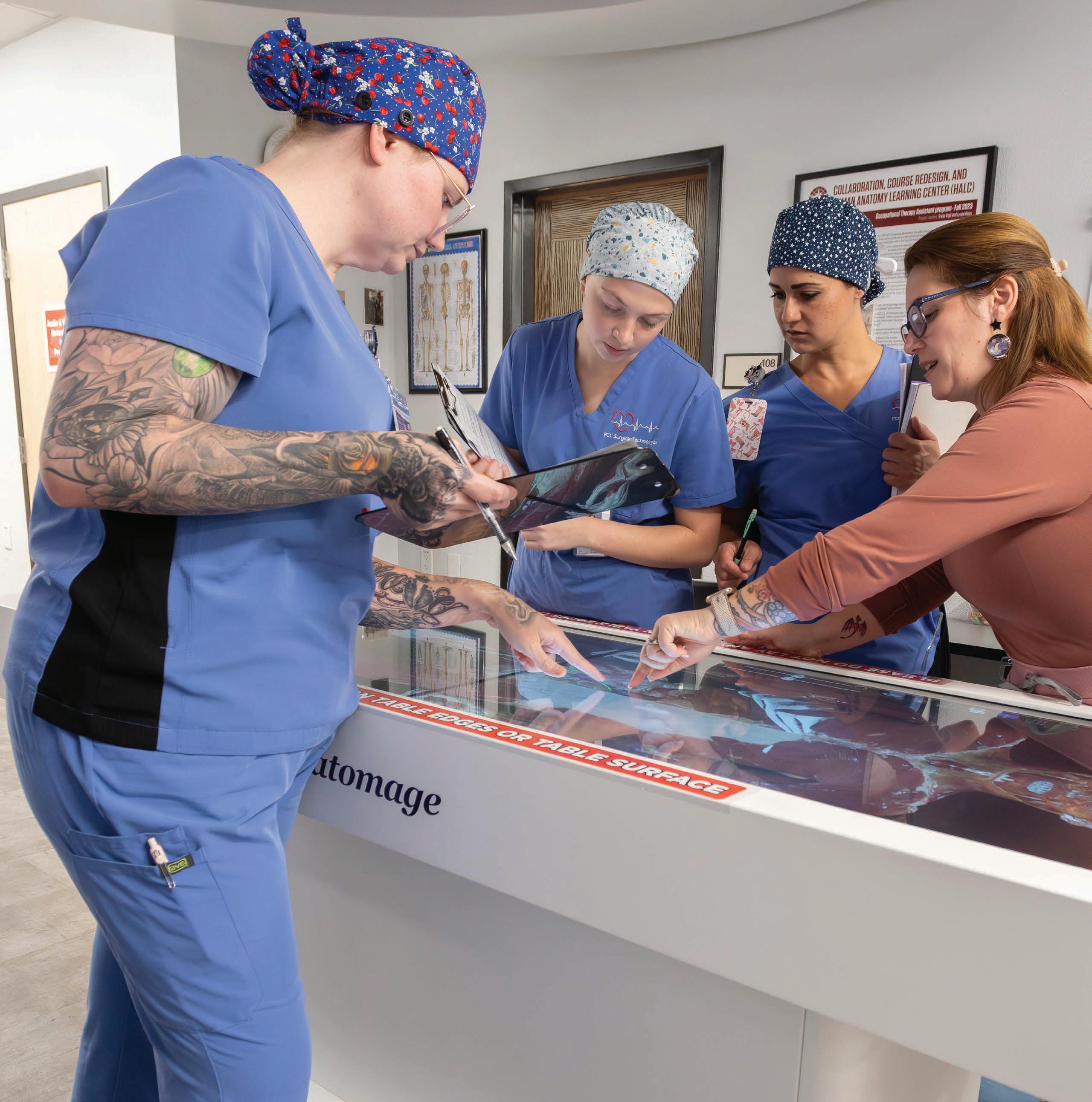
BUILDING
FUTURE S FUTURES
“Students become a lot more invested through hands-on experiences. Our hands are our best resources for learning.”
KAYLA AUBE , COORDINATOR , H UMAN ANAT OMY LEARNING CENTER
There’s nothing passive about a Pueblo Community College education. From nursing to automotive technology, PCC students spend their time applying program knowledge in practical ways.
“From our evaluations and feedback, that’s one of the most important things students mention about PCC: They get
to do,” said Jennifer Sherman, PCC’s vice president of academic support.
“It’s a safe space to develop skills, make mistakes and gain confidence.” While employers certainly still consider

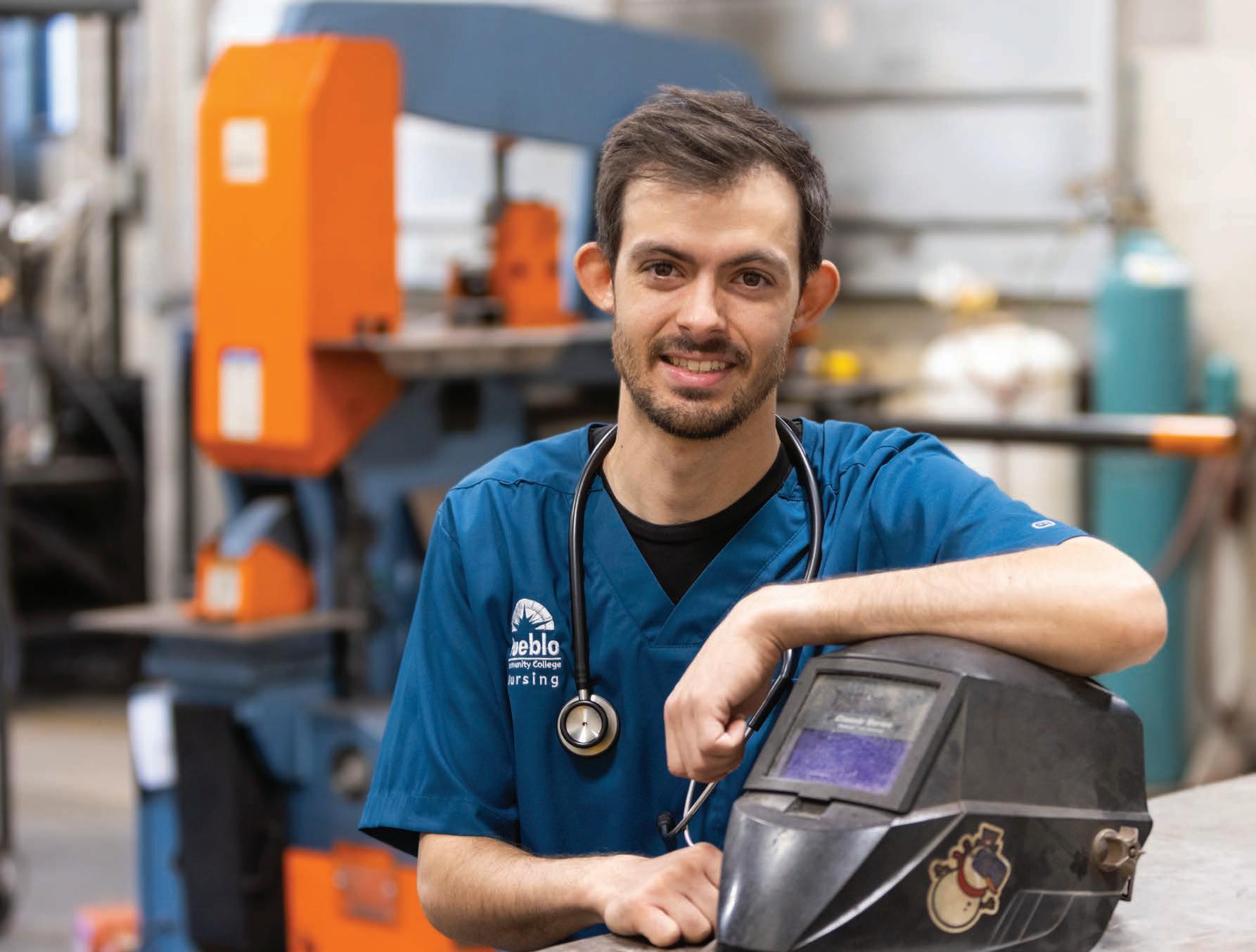
an applicant’s education level and GPA when making hiring decisions, more focus is turning to a college graduate’s demonstrated skills. The National Association of Colleges and Employers reported in its Job Outlook 2025 survey that nearly 65% of employers said they use “skills-based hiring practices for new entrylevel hires” and 90% utilize those practices when first interviewing candidates.
A hands-on approach has always been the standard for career and technical education programs such as automotive and welding. More recently, PCC’s opportunities for experiential learning have expanded significantly. The Nursing and Allied Health Teaching and Learning Center opened in January 2023 in a vacant wing of Pueblo’s St. Mary-Corwin Hospital in Pueblo. Nine health programs are based in the building, offering a real-world setting for students as they learn. A state-ofthe-art nursing simulation center and other labs are hubs for active experiences in disciplines such as radiologic technology, phlebotomy, and occupational therapy assistant.
PCC’s Human Anatomy Learning Center (HALC) has two human cadavers, a variety of Anatomy in Clay models, and two Anatomage tables, which are digital cadavers.
While the center is a natural fit with programs such as physical therapist assistant and
emergency medicine, it’s also frequently used by instructors in other disciplines. “Art students use Anatomy in Clay to build muscles on legs. It’s not to teach about muscles but to use art in a different aspect,” said Kayla Aube, HALC coordinator.
“For a psychology class about death and dying, we use the cadavers to talk about body donation – how it works and where the body goes. Students really enjoy that and there are usually a lot of questions.”
Xander Whipple is a student in PCC’s welding program and expects to graduate in spring 2026. He’s also taking prerequisites for the nursing program, which he plans to apply for after graduation. He has a work-study job in the HALC.
“It really is a coalescence of all my interests and the way I learn,” he said. “Hands-on learning helps me understand things on a more fundamental level (and) talking to all the other students, they really benefit from being in that environment.”
Aube continues to invite more departments and instructors to utilize the HALC for different aspects of their curriculum and hopes eventually to host every program.
“Students become a lot more invested through hands-on experiences,” she said. “Our hands
are our best resources for learning. For instance, with the medical assisting program, a lot of those students are just out of high school. They don’t realize the extent of what goes into their career. When they come to the HALC and see and touch things up close, they’re even more excited about what they can do. They’ll say things like, ‘Oh, that makes so much more sense now.’”
Biology faculty member Amanda Mayes found another way to connect her students’ knowledge to actions. For a spring 2025 class, she worked with colleagues to create a project combining biology with engineering design. Students not only expanded their skill sets, but they also put their designs to the test during a trip to the Arkansas River to collect waterquality data.
“I’m trying to bring about a different way of teaching. I want to be more intentional,” Mayes said at the time. “Sitting in class for two hours doesn’t work. When they leave here, they’re not taking exams or listening to lectures, so we want to create a bridge between the theoretical and the practical.”
Co-curricular and extracurricular activities provide more room for project-based experiences. The National Cyber League provides a platform for students to apply what they’ve learned to tackle real-world cyber threats. The Colorado Space Grant Consortium, funded by NASA, gives students access to hands-on projects, outreach programs, and new space technologies. Teams from Pueblo and the PCC Southwest campus in Mancos compete in multiple activities throughout the year.
Sherman said there are two ways the college emphasizes immersive learning – through degree or certification design and through facility design. A solar lab was added in Pueblo to accommodate new industrial technology maintenance and solar installation programs, and a new nursing simulation center is being built at the Fremont campus in Cañon City. It is expected to open in the latter half of 2026.
“That type of experience is what employers hope for and expect,” Sherman said. “It’s also a student engagement strategy: Keep them interested in what they’re learning.”
This experiential learning approach extends beyond the traditional academic side of PCC. Pueblo Corporate College, a division of PCC, has 10 mobile learning labs that offer specialized training and travel wherever they are needed. Employers who need to train employees in skills from electrical systems to manufacturing can develop a customized curriculum with Corporate College instructors and have the training done on site, so employees don’t have to travel. Two new labs offer cutting-edge simulators for heavy equipment operation and Commercial Driver’s License instruction, which currently are two of the biggest needs for regional employers.
“All of this is really a mindset and it’s not new for PCC,” said Sherman. “It’s not just that we have these opportunities for students; it’s that we make sure they evolve so it’s the best experience available.”
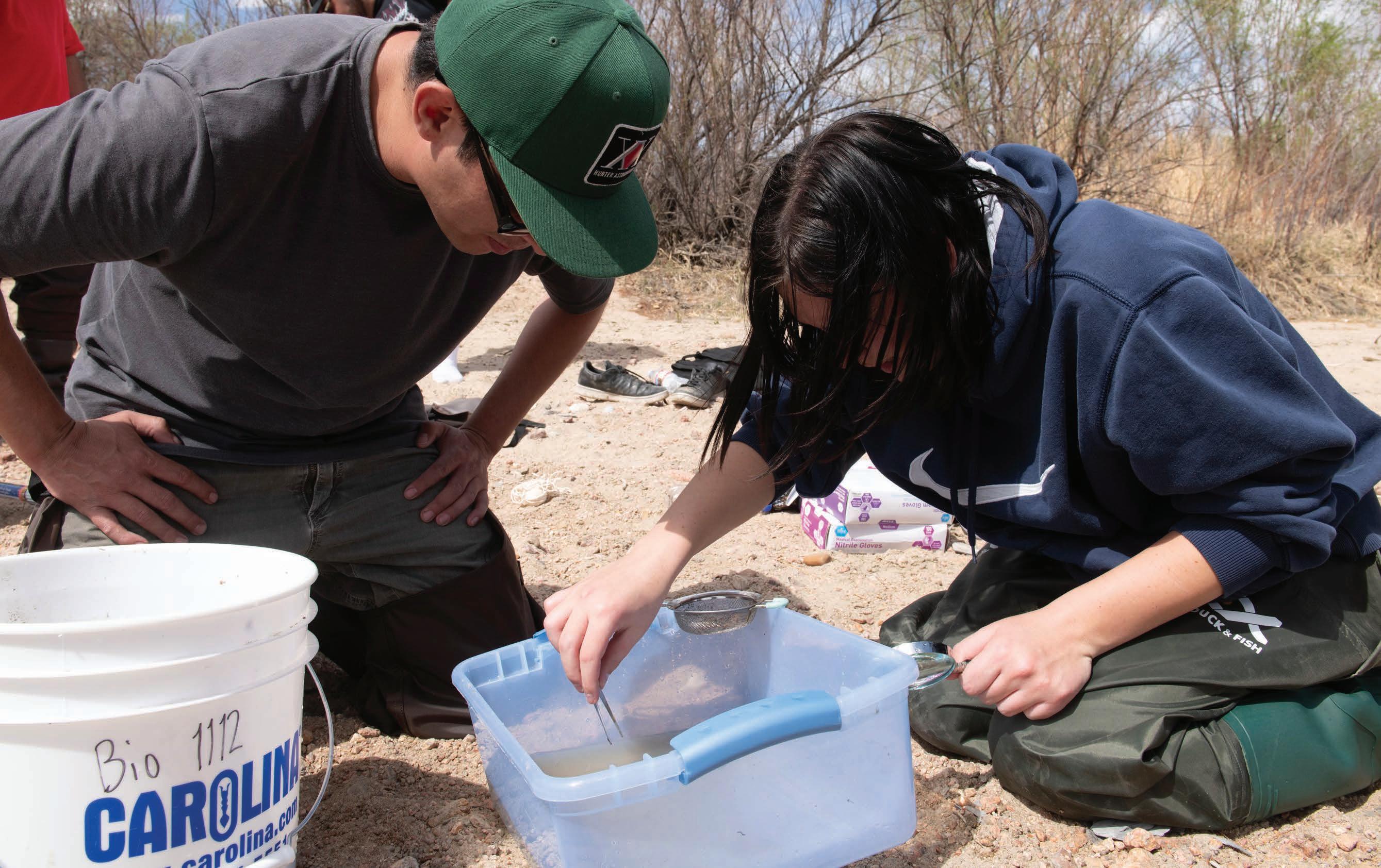
A LIFECHANGING GIFT:
MATTIE BJORUM REFLECTS ON SCHOLARSHIP IMPACT
For Mattie Bjorum, the road to higher education began in the small town of La Veta, Colo., and led her to the radiologic technology program at Pueblo Community College (PCC). With a heart for service and a love for learning, she is now pursuing her dream of becoming a registered radiologic technologist — a journey made a little easier thanks to the support of the PCC Foundation and its generous donors.
“My experience at PCC has been amazing,” Bjorum said. “I am so excited to be in the Rad Tech program. I’ve received so much support from people at the college, making my experience so far very good.”
From a young age, Bjorum knew she wanted a career that would allow her to help others. Her passion for both science and service made radiologic technology a natural fit.
“I have always had a passion for learning and helping others,” she said.
Bjorum is a first-year student in PCC’s program. After earning her associate degree, she plans to pursue a bachelor’s degree in either MRI, CT, or nuclear medicine. Mattie’s educational path was made smoother thanks to the Kane Family Foundation Scholarship awarded through the PCC Foundation.
PCC is one of seven southern Colorado schools receiving the merit-based scholarship funds that are made possible by the benefactors of the Kane Family Foundation, Wanden and Andy Kane of Fountain, Colo. According to its website, each year the Kane Family Foundation awards approximately 40 new four-year and two-year scholarships and provides approximately $1.3 million in scholarship funds to the seven participating schools.
After going through the application and interview process, three new PCC students are selected to receive the prestigious two-year scholarship every academic year.
The award pays full tuition, books, and fees. When Bjorum learned she had been selected as a recipient, she was overwhelmed.
“I was overjoyed and incredibly thankful to everyone who
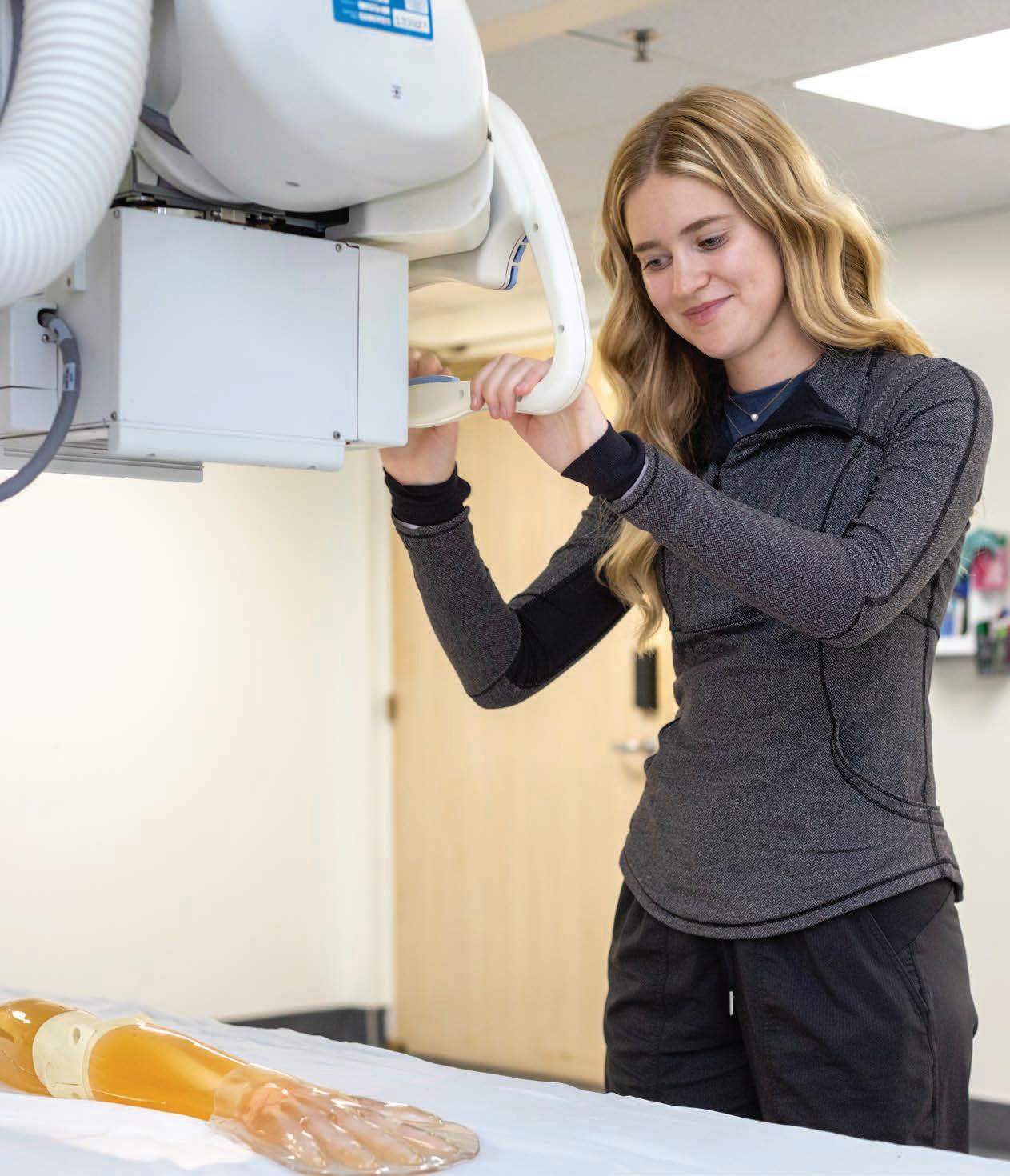
made it possible,” she said. “This scholarship has allowed me to focus less on the financial burden of college and more on fully immersing myself in my studies.”
For Bjorum, scholarships represent more than just financial assistance, they act as symbols of opportunity and hope.
“I believe scholarships are important because everyone comes from a different walk of life or different situation, and all deserve an equal chance to pursue higher education,” she said.
To the donors and community members who make these scholarships possible, Bjorum has a message from the heart:
“Your selfless donation makes a huge difference in each one of the scholars’ educational journeys. No matter how big or small the scholarship or donation is, each one makes an impact on our lives,” she said.
“I personally am incredibly grateful for the opportunity to receive a scholarship and to all the donors who made it possible.”
With a bright future ahead, Bjorum is a shining example of how determination, community support, and a passion for helping others can come together to create lasting change in her life and in the lives of those she will care for in her future career.
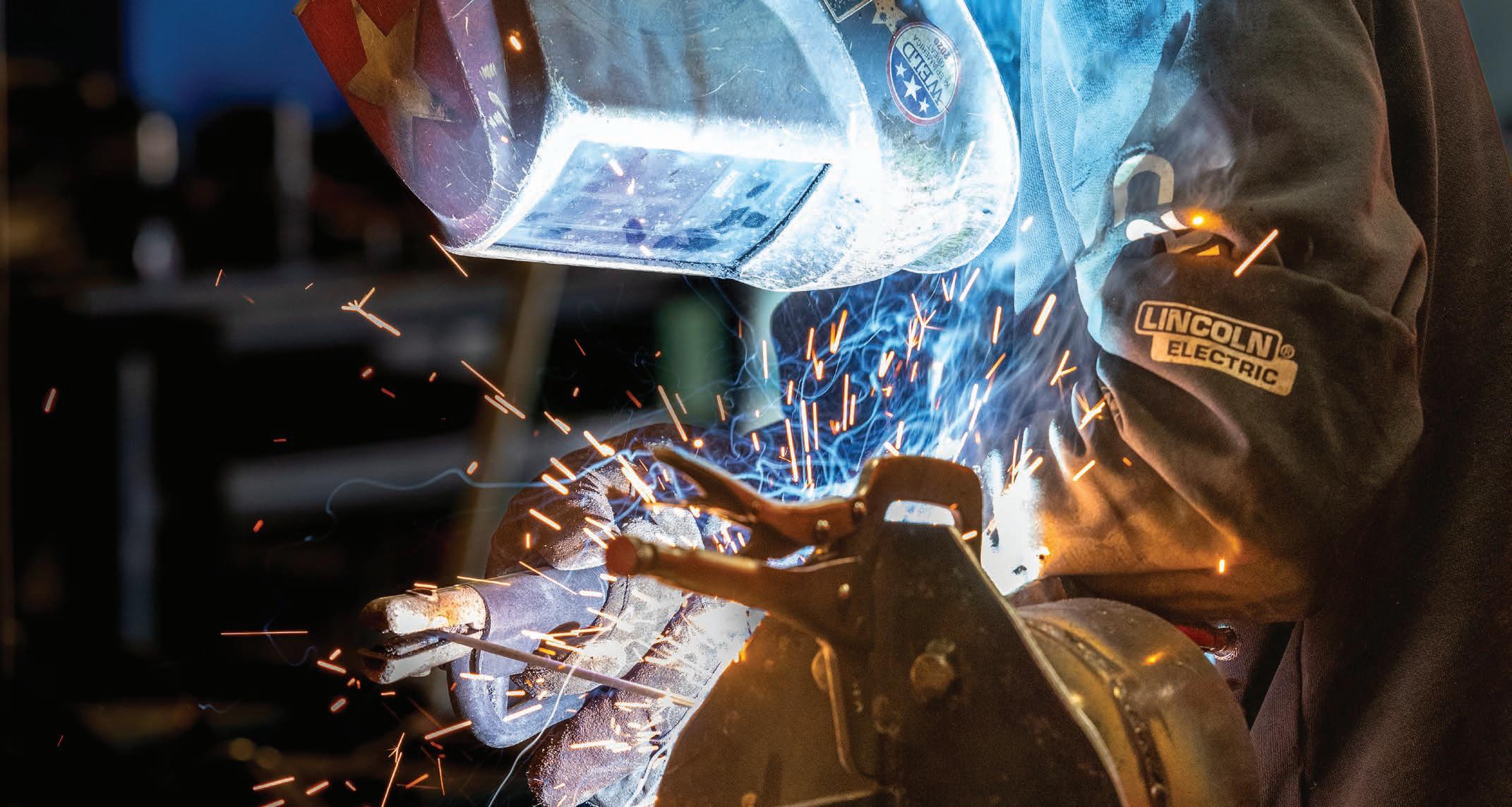
OPENING DOORS
EARNING COLLEGE CREDIT IN HIGH SCHOOL
Amelia Martinez started out thinking she wanted to study psychology but after taking a few Concurrent Enrollment (CE) classes at Pueblo Community College, she realized that she had a passion for astrophysics. She didn’t just want to understand the human mind; she wanted to understand the world.
Since her first class as a high school freshman at Pueblo South High School three years ago, Martinez has made steady progress and will graduate in the spring of 2026 with both her high school diploma and associate degree from PCC. While her talent for high-level math and physics may not be common, she is one of more than 3,000 high school students who attend PCC to find their passion and prepare for it in programs ranging from automotive technology to health sciences.
Concurrent Enrollment may go by other names throughout the U.S. or may be identified differently in the media. In Colorado, CE is the program through which high schoolers can earn college credit at low or no cost while still in high school. This is not limited to select programs – CE students take a range of classes from college English and math to career and technical programs such as welding and automotive. CE classes also count toward high school graduation requirements.
“We work very closely with high schools to make sure we are addressing needs specific to their communities and their students,” said PCC’s Vice President for Student Success, Michael Gage.
Martinez said she has enjoyed regular high school experiences
while participating in CE and feels it helped her with high school classes because she wanted to keep her grades high enough to be eligible to continue taking CE courses.
There is more than one way to earn CE credits. Some students attend classes at a PCC campus while others remain at their high schools. Classes in high schools may be taught by PCC faculty or by specially qualified high school teachers. Martinez attended college classes on both the PCC and South High campuses. She noted that coming to the campus was a big step, but the faculty and staff provided a safe and comfortable learning environment for her.
“CE is a big mix, and there is something for every student,” Gage explained. “The best thing a student can do to plan a path is to contact us to sit down and go over their particular options based on their interests and what their school offers.”
In April, another PCC Concurrent Enrollment student, Deanna Molina-Nevarez, was named the first recipient of the Rollie Heath Award. Given by the Colorado Community College System, the award recognizes a successful college student who earned CE credits and demonstrates academic excellence, leadership, and a commitment to community service.
PCC serves more than 50 high schools through its CE program from Mancos to Aurora, with most of the schools clustered around PCC’s campuses in Pueblo, Fremont, La Plata, and Montezuma counties. Over the past several years, the program has grown quickly both in the number

of students served and in physical locations.
This fall, Pueblo South High School added welding equipment so that a full welding certificate can be earned at the high school. Pueblo County High School was able to create a new machining space so the college could offer a manual machining certificate on site. The automotive program at Pueblo West High School expanded this fall, allowing students to earn more industryrecognized certificates in electrical systems, air conditioning maintenance, and brakes. The largest Concurrent Enrollment program at PCC is at Cañon City High School, where 91% of students take at least one CE class. While some students do graduate high school with an associate degree, this is not the goal for all students.
“Our goal is always to provide a high-quality college experience that prepares high school students for the workforce or other higher education opportunities at PCC or a university,” Gage said. And not all high school students are on the path to a degree. Some use certificates or job training to move directly into the workforce. For instance, students in Pueblo “love welding and cosmetology,” according to Jennifer Welte, Director of Concurrent Enrollment. A faculty member recently shared the story of a cosmetology nail tech graduate who is earning more than $65,000 annually and programs like welding are
always in demand due to their earning potential and the number of job openings in the industry.
One of the programs Martinez took part in was TRIO Upward Bound, which is how she first became aware of the CE program. Her brother Santiago also attended PCC as a high school student.
“What Concurrent Enrollment and Upward Bound do is so remarkable,” Martinez said.
Her advice to future students is to attend class every day, build a community and ask for support.
“There has always been someone to help me.”

“Concurrent enrollment is a big mix, and there is something for every student.”
MIKE GAGE , PCC VICE PRESIDENT FOR STUDENT SUCCESS
Cortez
Cañon City
Pueblo
Durango
Bayfield
ALL IN ON AI
HOW PCC EMPOWERS STUDENTS AND STAFF WITH EVOLVING TECHNOLOGY
The initial glimpse of Pueblo Community College’s future came from a middle school student.
Two years ago, PCC English and Communication faculty member Jamie Patti watched as her son demonstrated a new online tool that was rapidly gaining popularity among students. The program, called ChatGPT, enabled users to generate summaries, data, conversations, and even fulllength reports based on a few prompts – and responses could be tailored to sound like they were written by, say, a sixth grader. Patti’s response was immediate: A huge shift was about to occur, and colleges weren’t prepared for it. No one was.
“ChatGPT was free and immediately accessible,” she said. “Suddenly students had this powerful tool in their hands but didn’t know how to use it properly. There was no training, no instruction, no guardrails.”
Released in November 2022, ChatGPT was the first major player in an expanding wave of artificial intelligence (AI)
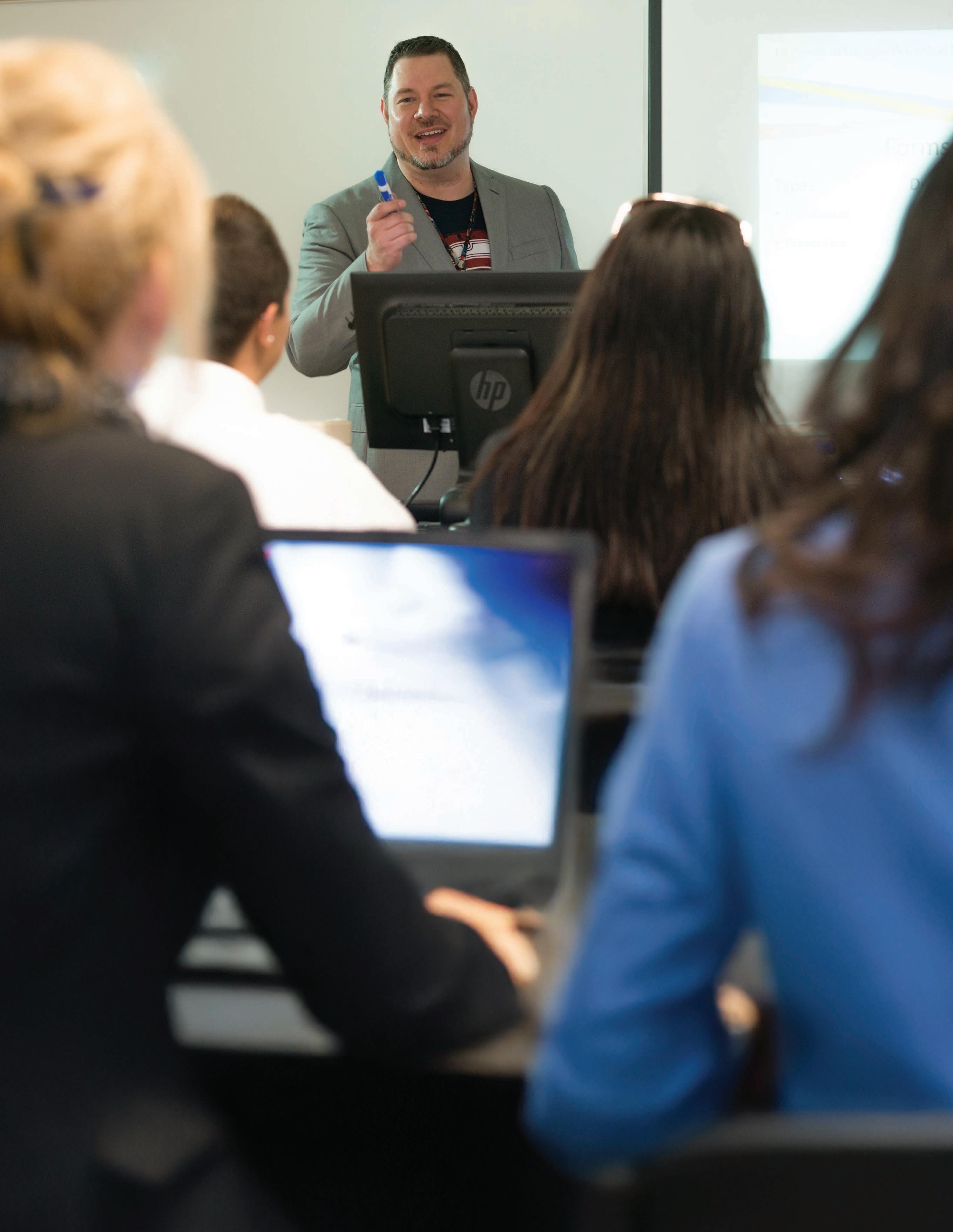
systems called large language models (LLMs). They use the vast amounts of information in their databases to generate human-sounding responses. Different programs can be used to generate images or perform other tasks, from simple to complex.
During 2023 and 2024, Patti, other faculty members and administrators gathered as much information as possible about AI, its possibilities, and its downsides. They formed a workgroup to create an AI framework for PCC that would help students, faculty and staff understand how to use AI ethically and responsibly.
“It would be the worst thing to not trust your students,” Patti said. “We had to rethink everything. We weren’t going to stop it or get ahead of it (and) what we were seeing as cheating, some employers were seeing as a skillset.”
A group of faculty members and a PCC administrator met France Hoang, founder and CEO of BoodleBox, at a national AI conference. BoodleBox is structured specifically for academic use and includes multiple LLMs including
ChatGPT, Gemini, and Claude. It allows collaboration among students and instructors and users can use or build custom bots aligned to different subjects or tasks. Instructors can also assess assignments to determine if and how AI was used.
That meeting led to the college becoming a pilot school for BoodleBox and earlier this year, Hoang worked with PCC President Chato Hazelbaker and Dean of Arts and Sciences Patrick Maille to make BoodleBox a core element of PCC’s operations. Maille and Hazelbaker also made the decision to provide access to everyone at the college, which is not typical among higher education institutions.
“Considering that the growth in the use of these technologies will impact everyone, we wanted to broaden their availability to the PCC community at large,” Maille said.
is, don’t let the bot do your thinking for you. As technology continues its rapid evolution, Patti said trust between instructors and students becomes more important. “I’m trusting that what you’re turning in to me is your own work,” she said. “Students want us to ask them questions so they can show they know the subject and did the work.”
“I’m proud of what this college is doing to prepare (with AI) without forgetting that we have those standards and priorities – academic integrity, honesty and human-centered learning.”
JAMIE PATTI , ASSISTANT CHAIR OF ENGLISH , COMMUNICATION , AND PHILOSOPHY
Maille said because different departments and disciplines can collaborate on projects utilizing BoodleBox, the college as a whole benefits. Employees can streamline administrative work, quickly summarize large quantities of information, and analyze data. Instructors can use it to improve research. The platform also provides advanced data security to protect any personal and institutional information that is uploaded.
“Giving staff an opportunity to be involved was a great move,” Patti said. “That they were willing to invest in that shows the level of support we have.”
Because BoodleBox offers the premium versions of each LLM, another academic issue was addressed: “When we started out, we weren’t catching cheaters that were using paid versions,” said Patti. “If we allowed those who can afford paid AI to continue, that equity gap would continue to grow.”
When the AI workgroup started developing a toolkit for PCC instructors, the directive was to create policies that are clear, consistent, fair, and equitable. Instructors provide students with clear syllabus statements and can tailor those to best fit their courses. The toolkit provides examples of other AI guidelines, instructions about citing AI as a source, guidance about integrating AI into learning experiences, how to detect misuse of AI, and best practices for data security.
“I appreciate how our faculty are viewing AI as a teaching tool and an essential skill that our students need to have to be workforce ready,” said Hazelbaker. “In some ways, this is just the next evolution in adapting technology to learning – similar to what we did with calculators, computers, the internet and now AI.”
Another aspect of teaching in an AI world is learning how to utilize it while maintaining critical thinking skills – that
Patti noted that even those who are not fans of AI – a group that includes many students – realize the benefits of understanding it and learning how to use it in their academic, professional, and personal lives.
“Students are really candid with us about what they like and dislike about AI,” she said. “We created a toolkit for instructors so they can share that feedback and we can address it in the right way.”
Students want to know how AI will affect their careers and how it will help them learn. In addition to providing AI tools specific to their program of study, a core element of instruction at PCC is learning how to proofread the information generated by the technology.
“AI doesn’t tell you the whole story. It’s not credible enough,” Patti said. “We show them how it can hallucinate and give the wrong information – and how that can affect their career, not just their academics.”
The Colorado Community College System, of which PCC is a member, approved its own AI usage policy in May. Due to her experience with developing PCC’s policy, Patti was a faculty representative on the CCCS committee.
PCC continues to be a leader in integrating AI into its mission and operations. The college will host an AI workshop Nov. 14 for its regional partners in education and workforce development.
“I’m proud of what this college is doing to prepare without forgetting that we have those standards and priorities – academic integrity, honesty and human-centered learning,” Patti said. “It’s been exciting to have the school be in a position to shape how our students, employees and communities use AI.”
4,609 CONCURRENT ENROLLMENT STUDENTS SER VED BY THE NUMBERS
98% 2024 GRADUATES WERE EMPLOYED OR CONTINUING THEIR EDUCATION
5,764 PUEBLO
9,619
TOTAL ENROLLMENT
1,997 SOUTHWEST
1,409 FREMONT
449 FULLY ONLINE
ANNUAL ENROLLMENT FOR 2024 - 2025
13.2 AVERAGE CLASS SIZE
50% STUDENTS IDENTIFY AS HISPANIC
57%
MORE THAN HALF OF OUR STUDENTS ARE FIRST GENERATION
WHERE OUR STUDENTS LIVE
74% Pueblo
12% Fremont County
9% La Plata
5% Montezuma
TOP ACADEMIC PR OGRAMS Behavioral Health Medical Imaging Advanced Manufacturing Nursing
$17.5M
Grants as an HSI supporting Hispanic students, such as TRIO, STEM EDGE, and OPTICA through 2026.
1,353
PCC Corporate College trained 1,353 area workers through its programs in the 2024-2025 academic year. PCC’s largest partners include EVRAZ Pueblo, GCC Rio Grande, CR Minerals, Colorado Department of Corrections, and the Colorado Department of Youth Services.

LOCA
WE SUPPORT Pueblo, Fremont (Cañon City), Mancos/Cortez and Durango
$1,323,000 2024-202 5 SCHOLARSHIPS & PROGRAM SUPPORT 708
SCHOLARSHIPS T O 505 STUDENTS 2024-2025 Academic Year
$22.9 Million DONOR- RESTRICTED FUNDS 89¢ of every $1 GOES DIRECTLY T O THE FOUNDATION MISSION OF SUPPORTING PCC STUDENTS AND PROGRAMS
LONGTIME SUPPORTER MAKES FREMONT NURSING LAB A REALITY
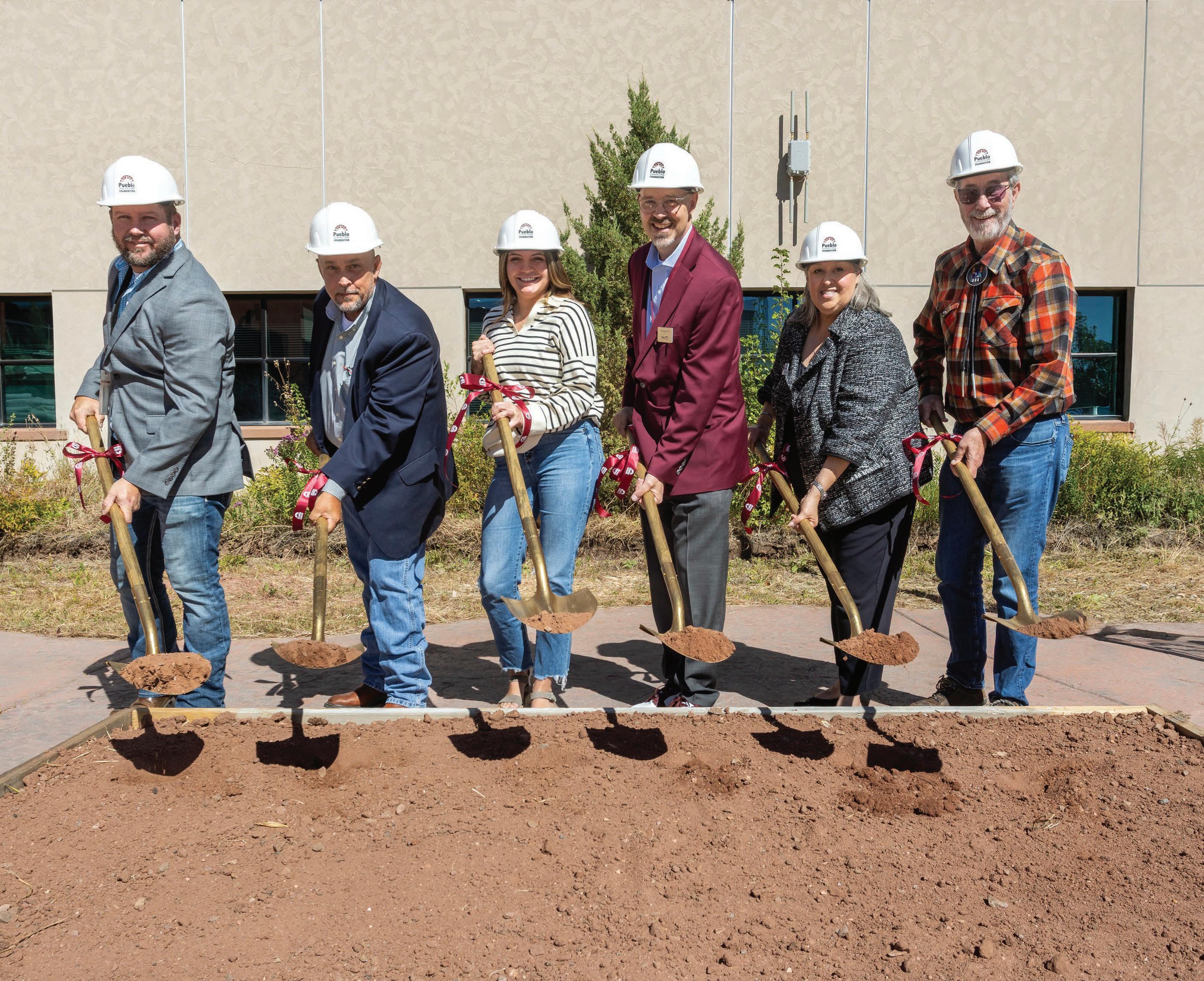

With golden shovels in hand and deep gratitude in their hearts, leaders from Pueblo Community College, community members, students, and donors gathered at the PCC Fremont campus in Cañon City Sept. 25 to break ground for a new nursing simulation center — a project made possible by a generous $2 million gift from local philanthropist Walter Schepp.
The donation from Schepp, a longtime supporter of the community college and resident of Cañon City, will fund the construction of the state-of-the-art lab. The new instructional space will expand the Fremont Campus by 3,026 square feet and dramatically enhance hands-on training opportunities for the campus’s largest program to help meet growing healthcare demands in rural Colorado.
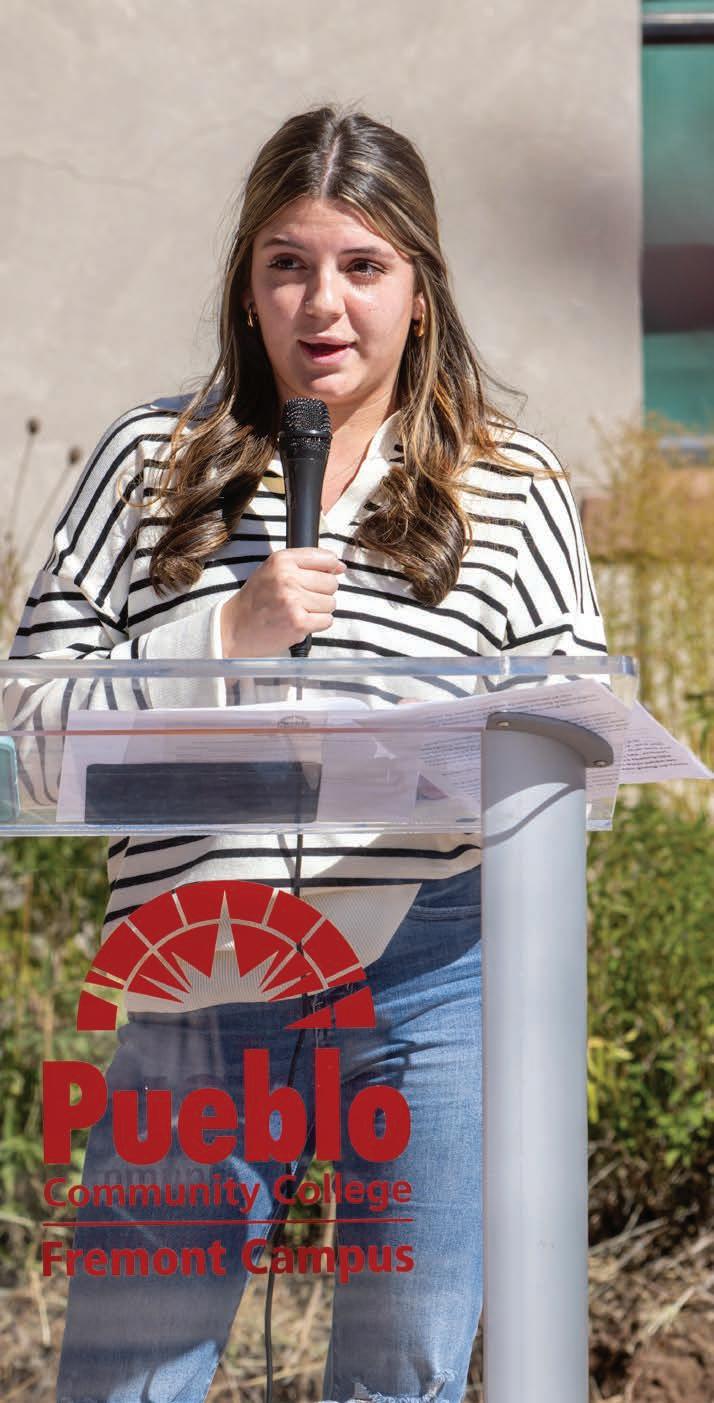
“This is the kind of project that can be transformational, not only in individual lives, but can be transformational for the community. The vision of the college is to make sure that we empower students with livingwage jobs to improve their communities,” said PCC President Chato Hazelbaker.
Schepp and his late wife Gloria have been steadfast supporters of PCC and have given a remarkable total of over $4.6 million to campus facilities, programs, and student scholarships over the past few decades.
“The new space will feature two clinical classrooms, one designed to replicate a general hospital room and the other a labor and delivery suite. With two independent control rooms, our faculty will be able to run multiple simulations at one time, providing students with real-world training in a safe learning environment,” said Fremont Campus Administrator Mike Maffucci.
Currently, students must travel to facilities in Pueblo, Florence, and Cañon City for simulation experiences. The on-campus center will consolidate instruction, labs, and simulations in one location, making transportation less of a factor for students.
“The goals that were set forth for students and staff in planning the new center include creating an extremely high-quality and comfortable student-centered space in an already familiar environment here on their home campus and allowing students to save money on gas and time (traveling),” said Fremont Campus Nursing Coordinator Joan Pope.
First-year nursing student Kaylee Ontiveros spoke on behalf of her classmates, sharing the emotional weight and significance of the new facility and thanking the Schepps for their generous contribution. She noted that the lab represents far more than just upgraded equipment.
“Nursing school is hard,” Ontiveros admitted. “But then something like this happens… A space is built. The door opens and someone like Walt steps in and says, ‘I believe in you.”
Calling the lab a place where future nurses will grow through challenges, mistakes, and mentorship, Ontiveros emphasized that the support behind the scenes is what truly fuels their journey.
“Your investment is not just in tools or walls,” she said. “It’s in our growth, our resilience, and our futures.”
Julie Rodriguez, CEO of the PCC Foundation, is grateful to the Schepps for their continued support.
“The trust they are instilling in the foundation and the college to utilize their generous donation will elevate the quality of education the Fremont Campus nursing students receive. The Schepps’ substantial contributions and long-standing commitment to the Campus are a true testament to their support of their beloved Cañon City community,” Rodriguez said.
The nursing simulation lab at the Fremont campus is expected to open in fall 2026.
Pueblo Community College
900 W. Orman Avenue
Pueblo, CO 81004
719-549-3303
www.pueblocc.edu/aboutus/foundation
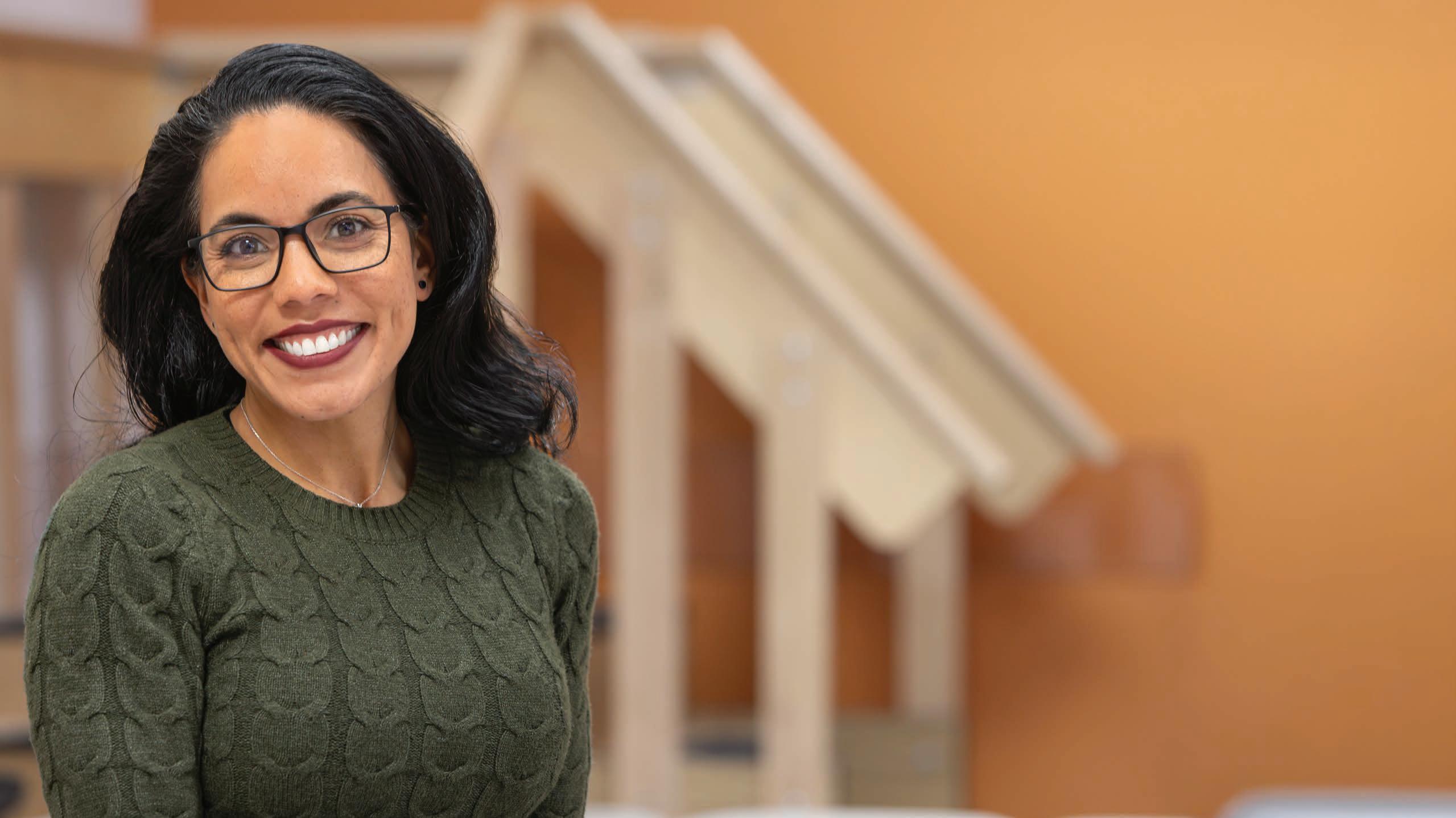
“TheconnectionsandskillsI'vegainedat PuebloCommunityCollegearethetoolsI'll usetomakeadifference,aswellasgiveback tothecommunitybymakingPueblomyhome base.Thisopportunitywouldn'thavebeena realitywithoutthegenerousscholarshipfrom thePuebloCommunityCollegeFoundation.I amtrulythankful.”
CRYSTAL AGUON, PCC PHYSICAL THERAPIST ASSISTANT STUDENT AND RECIPIENT OF THE KANE FAMILY FOUNDATION SCHOLARSHIP
